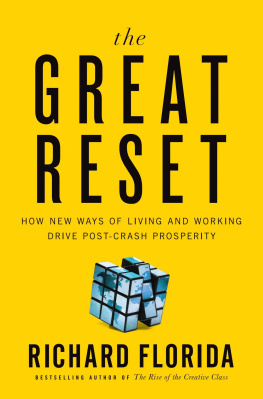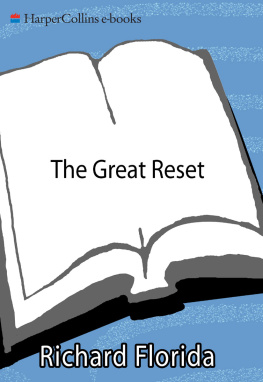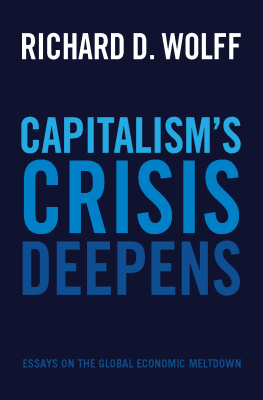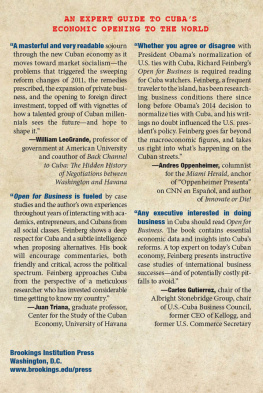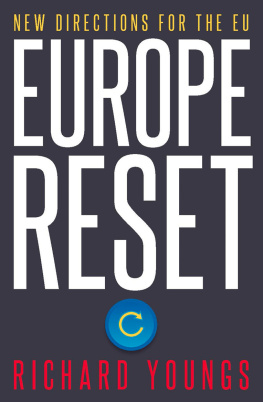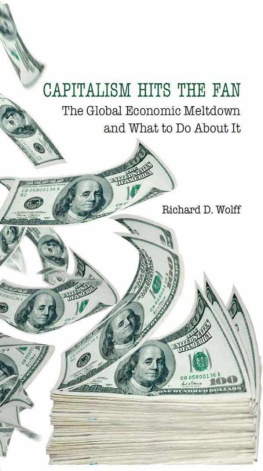For Zak
I t isnt as though we didnt see it coming. To many of us, it may feel as though our society turned almost overnight from prosperity to chaos. But in fact the financial crisis that stopped the economy in its tracks in 2008 and 2009 was years, perhaps even generations, in the making. Its easy to point fingers, to scapegoat the high-flying bankers and mortgage lenders whose high-risk shenanigans leveled the financial markets. But that would perhaps be like blaming fast food for obesity.
Weve been bingeing for a long time. For twenty-five years or more, the U.S. economy grew and grew, feasting on the unchecked consumption of a never-ending cascade of real estate, goods, and gadgetry. The United States used to be revered for its innovative capacity, its so-called American ingenuity, but all that somehow got refocused on overly risky financial innovation. The economy became a giant bazaar, fueled by easy credit. At the same time, the financial markets, once a haven for investors, mutated into rolling casinos, where many of our most brilliant minds gambled recklessly, making bets of dizzying complexity. Its been nearly ten years since Alan Greenspan revised his description of irrational exuberance, replacing it with the more condemning phrase infectious greed as he watched the house of cards rise higher and grow ever more precarious.
Inevitably, it all came crashing down, but this isnt news to anyone. Nor is it anything new. Weve been here before. Not just now, but at two other critical times in the last 150 yearsin the 1870s and the 1930sthe economy caved in and depressions ensued. Both times, however, we emerged from those dark times healthier and wealthier than before. And it can happen again.
Enough time has already been spent uncovering the roots of this crisis and predicting the depths to which the economy may or may not fall, and at which point it will rebound. The real point of looking backward is to learn for the future, and we have much to learn from the crises and recoveries of the past. These were eras of real devastation and pain that left gaping holes in our economy and society. Nature always abhors a vacuum. For every institution that failed, for every business model that outlived its usefulness, new and better ones rushed in to fill the void. Past periods of crisis eventually gave rise to new epochs of great ingenuity and inventiveness. They were the times when new technologies and new business models were forged, and they were also the eras that ushered in new economic and social models and whole new ways of living and working.
The clock of history is always ticking. We can cross our fingers and hope for the best, or we can take steps now to move toward a better, more prosperous future. Weve weathered terrible crashes and depressions before, and weve always picked ourselves up and unflinchingly remade our economy and society, setting the stage for longer-term prosperity. As times have changed, weve embraced new ways of working and living and new ways of organizing our cities, providing the foundation for growth and recovery. Time and again, weve come out of the crises surely stronger in the broken places, richer in ways both tangible and intangible. In The Great Reset , I look back on the key elements of our previous epochs of crisis and change, in the hope that it can help us better identify the key elements of our current transformation and provide a framework for guiding us toward a new era of lasting prosperity.
I cant help wondering what my parents would be thinking right now. Born in the 1920s, my mother and father lived through many of the greatest upheavals of the twentieth century, from the Great Depression of the 1930s to the roaring recovery of the decades that followed the Second World War. Both grew up in Newark, New Jerseys Italian district, my fathers home absent a refrigerator or indoor plumbing. They recounted stories of the bread lines and tent cities and government-issued clothing that marked the urban misery of the Depression years. My dad left school at age thirteen and took up work in an eyeglasses factory, combining his wages with those of his father, mother, and six siblings to make a family wage. At Christmas, his parents, unable to afford new toys, wrapped the same toy steam shovel, year after year, and placed it for him under the tree. But thirty years later, they were able to follow countless contemporaries to the greener pastures of the suburbs, buying first a house all their own, then a shiny new Chevy Impala, a washing machine, and a television, and raising their children in relative security. My father saw his low-wage jobin the very same factoryturn into good, high-paying work that could support our entire family.
The economic peaks and valleys that my parents experienced are part of the life cycle of any society. They can be difficult, sometimes horribly painful, but just as trees shed their leaves in the fall to make room for the new growth of spring, economies reset themselves. Times of crisis reveal what is and isnt working. These are the times when obsolete and dysfunctional systems and practices collapse or fall by the wayside. They are the times when the seeds of innovation and invention, of creativity and entrepreneurship, burst into full flower, enabling recovery by remaking both the economy and society. Major periods of economic transformation, such as the Great Depression or the Long Depression of the 1870s before it, unfold over long stretches of time, like motion pictures rather than snapshots. Likewise, the path to recovery can be long and twistedthe better part of three decades in the case of those two previous crises. Seen in the greater context of history, economic crises inevitably give rise to critical periods in which an economy is remade in ways that allow it to recover and begin growing again. These are periods I call Great Resets.
S itting at his perch in the British Museum, Karl Marx wrote trenchantly about the violent shift from an older agricultural economy to a modern capitalist one. Capitalism, the most innovative, revolutionary economic system of all time, was also prone to financial panics and economic crises. Despite the massive deprivation and human suffering they caused, these crises played a fundamental role in propelling the economy forward. They were critical moments when existing economic and social arrangements were remade, enabling new periods of economic growth. Born in the same year that Marx died, the great theorist of innovation and entrepreneurship, Joseph Schumpeter, used the phrase creative destruction to describe how economic crises sweep away old firms and outmoded economic systems and practices, clearing the way for entrepreneurs to introduce new technologies and even entirely new industries and setting into motion a new era of growth. John Maynard Keynes saw in these crises the need for government spending to essentially protect capitalism from itself. With the private sector flat on its back, government spending was the only way to keep capitalism going and get the economy back on its feet. Each of these important thinkers described the part of the process by which busts slowly turn around and lead to booms, but real, lasting recovery requires more than bursts of technological innovation and new roles for government.
President Barack Obamas chief of staff, Rahm Emanuel, likes to quote Paul Romers now-famous maxim about a crisis being a terrible thing to waste.1 The fact of the matter is that were wasting it, big time. The whole approach of throwing trillions of public dollars at the old economy is shortsighted, aimed at restoring our collective comfort level. Meaningful recovery will require a lot more than government bailouts, stimuli, and other patchwork measures designed to resuscitate the old system or to create illusory, short-term upticks in the stock market, housing market, or car sales. Government spending cant be the solution in the long run. Though government can fill in gaps for a while, it simply lacks the resources to generate the enormous level of demand needed to power sustained growth.

